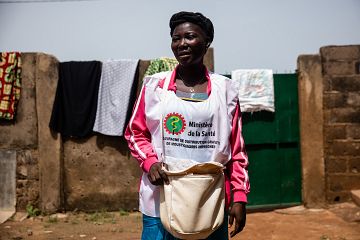New monitoring and evaluation toolkit will help improve SMC implementation and impact assessment
22 June 2021
Malaria Consortium welcomes the recent publication of the Seasonal Malaria Chemoprevention (SMC) Monitoring and Evaluation (M&E) Toolkit by the SMC Alliance. The toolkit outlines a performance framework for SMC implementation and provides a list of recommended indicators and methods for estimating SMC coverage and adherence.
The SMC Alliance was created in 2013 by SMC implementing countries. Now attached to the Roll Back Malaria Partnership (RBM) to End Malaria, it is a working group that brings together the global SMC community. The SMC M&E Toolkit has been developed by an M&E sub-group within the Alliance and is the first time that stakeholders have come together to define a universally agreed set of indicators for M&E of SMC activities, in addition to a common terminology to describe them.
“The SMC Alliance has been the ideal forum to share the work we’ve been doing to strengthen monitoring and evaluation across our own programme activities and make a real contribution to this toolkit,” said Sol Richardson, Epidemiologist leading on M&E activities for Malaria Consortium’s SMC programme and a member of the SMC Alliance M&E sub-group. “Establishing standardised objectives and corresponding impact indicators of SMC will help harmonise approaches to monitoring SMC programmes analysing the impact of the intervention to ensure indicators and methods for data collection are comparable across countries and implementing partners. It is a valuable resource that can be used by National Malaria Control Programmes and partners to improve the collection, quality, analysis and use of routine data collection and programme data and support governments and partners in decision-making and priority-setting.”
Malaria Consortium has led the scale up SMC across the Sahel region of west and central Africa since 2013 and more recently piloting projects in east and southern Africa, reaching over 12 million children in Burkina Faso, Chad, Mozambique, Nigeria and Togo in 2020. The organisation has been committed to implementing rigorous monitoring and evaluation of the performance of its programme and was able to share its experience of designing an extensive M&E indicator framework with the SMC Alliance to inform this work.
Both Malaria Consortium’s own SMC M&E framework, which it has been developing since late 2019, and the SMC Alliance toolkit will significantly contribute to demonstrating the coverage and quality of programme implementation, playing a valuable role in helping implementers of SMC across different countries to align their approaches to M&E sources. Importantly, they will also help to inform logistical and technical decision making around quality of delivery, coverage, effectiveness, safety, knowledge and acceptance of SMC among programme beneficiaries, cost, data quality and its use in assessing the effectiveness and impact of SMC in individual countries and more broadly across the region.
Related content
6 October 2020
Designing and implementing a monitoring and evaluation framework for seasonal malaria chemoprevention
Latest news
- Malaria Consortium honoured by Ugandan government for contribution to combat malaria23rd April 2024
- International summit calls for AMR accountability in public health interventions21st March 2024
- Global SMC community celebrates new milestone at SMC Alliance Annual Meeting in Nigeria6th March 2024
- Scaling up key interventions could halve pneumonia-related childhood mortality13th February 2024
- Malaria Consortium and eGov Foundation join Mozambique’s national malaria programme to digitalise seasonal malaria chemoprevention campaigns8th February 2024
- World’s first malaria vaccine rollout launched in Cameroon22nd January 2024